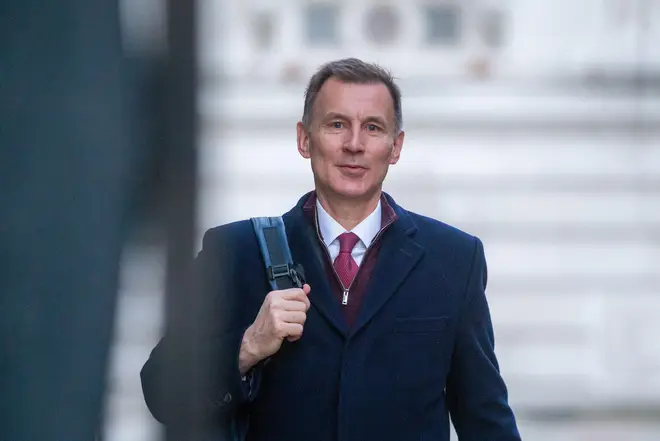
Nick Abbot 10pm - 2am
1 February 2024, 09:18 | Updated: 27 February 2024, 08:18

Jeremy Hunt has cast doubts over introducing big tax cuts at the next budget.
But the Chancellor insisted he does still want to "lighten the tax burden” for struggling Brits.
It comes after the International Monetary Fund (IMF) warned Britain’s growing debt pile and pressures on the NHS make more tax cuts unaffordable.
"It does not look to me like we will have the same scope for cutting taxes in the spring Budget that we had in the autumn statement," Mr Hunt told the BBC's Political Thinking podcast.
"And so I need to set people's expectations about the scale of what I am doing because people need to know that when a Conservative government cuts taxes we will do so in a responsible and sensible way."
He added: "But we also want to be clear that the direction of travel we want to go in is to lighten the tax burden."
The senior Conservative said he is still waiting for the "final numbers" from the Office for Budget Responsibility (OBR) to tell him how much so-called fiscal headroom he is likely to have to administer tax cuts or spending increases while meeting his fiscal rules.

''This is government that has the highest tax in 70 years'', Nick Ferrari tells Tory MP Laura Trott
He criticised the UK's fiscal watchdog after its chief appeared to liken public finance forecasts last year to a "work of fiction".
Mr Hunt said it was "wrong" for Richard Hughes, chairman of the OBR, to have made the remarks.
Earlier this month, OBR boss Mr Hughes offered a sharp criticism of Government clarity on projected public spending during an appearance before the Lords Economic Affairs Committee.
He told peers: "Some people call (the projections) a work of fiction, but that is probably being generous when someone has bothered to write a work of fiction and the Government hasn't even bothered to write down what its departmental spending plans are underpinning the plans for public services."
Many economists complained that last year's autumn statement had factored in implausible squeezes to public spending, as the Chancellor sought to introduce tax-cutting measures while keeping a tight lid on projections for departmental budgets.
Asked about the remarks, Mr Hunt said: "Those words are wrong and they should not have been said.
"The Government decides spending plans and spending reviews.
"The next spending review will start in April 2025 and obviously until that point when that spending review is done, we do not publish our spending plans. No government ever has."
But Paul Johnson, director of the Institute for Fiscal Studies (IFS) think tank, said Mr Hunt's current spending plans mean there could be "some pretty significant cuts" for some public services even before further tax cuts are administered.
The comments come after the International Monetary Fund (IMF) on Tuesday warned further tax cuts could risk the Government's ability to invest money in the NHS and other vital services.
Mr Hunt cut national insurance in November's autumn statement, a move the OBR thinks will cost the Treasury about £9.76 billion in the 2028 tax year.
In a reduction that came into force on January 6 and is being felt in pay packets this month, the main rate of national insurance was sliced by two percentage points, from 12% to 10%.
The Treasury says the change means a worker on a £35,000 salary will be £450 better off a year, although critics say the benefits are offset by the continuing freeze in personal tax thresholds, pulling millions into paying more to the Exchequer.
Ahead of a likely election later this year, Mr Hunt appears keen to cut taxes even further if he can, in a bid to boost the Conservative Party's chances of clawing back a heavy opinion poll deficit against Labour.
Mr Hunt hinted that the IMF's comments had irked him but said he agreed that "untargeted tax cuts that are just crowd pleasers" are not a good idea.